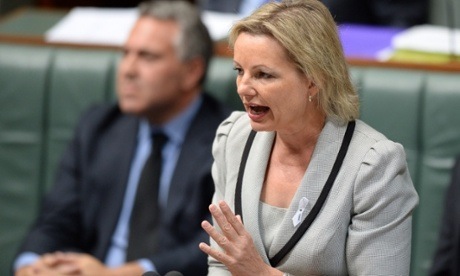
Sussan Ley has reaffirmed government plans to make many patients pay more when they see the doctor, describing the Medicare levy applied through the tax system as “hopelessly inadequate” in covering costs.
The new health minister scrapped a $20 cut to Medicare rebates for short GP visits that was due to take effect on Monday but the government remains determined to push ahead with other measures including a $5 co-payment likely to apply to adult non-concession patients from July.
In a series of interviews on Friday, the minister emphasised she would consult doctors to “refine” the details, acknowledging “genuine distress and angst” among GPs about the now-shelved cuts to rebates for visits shorter than 10 minutes.
“I don’t want to be at war with the medical profession,” she told ABC TV’s News Breakfast.
The Labor opposition argued Australia’s health system was relatively efficient by world standards and called on the Coalition to abandon the “GP tax”, warning it could discourage people from seeing a doctor before their condition worsened.
Ley said it remained government policy to reduce Medicare rebates for adult non-concession patients by $5 – a cost doctors said would be passed on the patients. She raised concern about the large number of non-concessional patients now obtaining bulk-billed services.
“The price signal is about somebody paying a bit extra when they go to the doctor and not receiving a bulk-billed consultation when they can afford to pay,” the minister told ABC Radio National. “That’s what we mean by the price signal and I think that’s vital.”
Ley said medical clinics had “built a business model around high-volume patient throughput” and that was “great for people who say we now want to attend this clinic”.
“But I think most people in their heart of hearts would admit that it’s also OK for them to pay a little bit more than a concessional patient,” she said.
“I as health minister want to protect the concessional patient, the vulnerable, those with chronic disease who actually aren’t going to be able to afford repeated additional payments; and we have. We’ve said that they will not have to pay additional, but someone else will.”
Medicare is funded through Australia’s progressive tax system, including through a specific levy on 2% of taxable income. But Ley said Medicare was “not sustainable now” and the levy was inadequate.
“The Medicare levy raises $10bn approximately at the moment and the cost of Medicare is $20bn, so the Medicare levy is hopelessly inadequate in funding Medicare,” she said.
“The scary thing is that in 10 years’ time the cost of Medicare will be $34bn and, while the Medicare levy will be a bit more, it will be nowhere near that figure. Everyone recognises we need to make Medicare sustainable and we can’t have it collapse under its own weight.”
In the same interview, Ley noted that the funds from the proposed co-payment would be channelled into government’s medical research future fund, describing it as “an investment in our future health”.
“The $5 co-payment that is still government policy is destined to go into that fund. We need to make that investment.”
Labor’s health spokeswoman, Catherine King, said the government’s argument about Medicare sustainability was a “sham” because “not a single dollar” from the co-payment would be reinvested in Medicare.
King said only 30% of Medicare Benefits Schedule funds went to general practice, yet that part of the system saw more than 80% of the patients – indicating it was “good value for money”.
“Whilst we saw a backdown yesterday there is still $2bn being ripped out of frontline services funding that goes to general practice and making sure that our universal health insurance scheme continues to be affordable and accessible for all Australians,” she said.
The opposition leader, Bill Shorten, said Ley’s comments showed the government had not changed their mind on “wrecking Medicare” and had “an ideological bent against bulk billing”.
Labor, the Greens and numerous crossbench senators have expressed their strong opposition to introduction of a co-payment, saying it undermines Australia’s universal healthcare system. They have also argued Australia’s spending on health is modest by international standards.
Health spending in 2012 was 9.4% of gross domestic product, according to a report by the Australian Institute of Health and Welfare. This figure was similar to the Organisation for Economic Co-operation and Development median of 9.2% and the 16.9% of the US.
The Australian Medical Association’s vice-president, Dr Steve Parnis, said he was pleased the new minister had acknowledged the need for consultation as this had been a missing element of the government’s previous attempts to change the health system. “The detail matters,” Parnis told the ABC.
“We hear the minister talk about price signalling. What we want that to mean is a recognition of the value of the services given.
“What we don’t want it to mean is a disincentive for people to see their doctor, because we know that if you discourage them – and they do go and see doctors for good reasons – then that runs the risk of delaying and allowing medical problems to become more severe.”
The independent senator Jacqui Lambie said Tony Abbott and the Coalition “hated” the fact Australia had a universal publicly funded health system.
“Mr Abbott’s sudden political backflip was motivated by the threat of a massive voter protest, and loss of more seats than expected in the Queensland state election,” Lambie said.
“I won’t be fooled. After the dust from the Queensland election settles, I expect the Liberals and Mr Abbott to continue their public campaign to destroy Medicare.”
